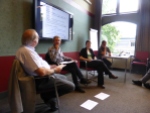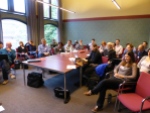Social Simulation Conference 2015
A few weeks ago some of us (Emilie, Maja & Nanda) were in Groningen, NL, to attend & present at the social simulation conference 2015 (14-18 Sept). We will share our impressions with you, but first let’s tell you about this event.
The social simulation conference is a conference for scientists that use computational modelling as a method for doing social science. For example, research concerned with understanding the role of fisher behaviour within the fishery in terms of species collapse, exploration of regulations using of an agent-based model. It is the main event of the European Social Simulation Association (ESSA). Typically it conference is attended by modellers from all over the world and agent-based modelling (ABM) is the mainstream method used. Note: this conference was previously called ‘the ESSA conference’.
a method for doing social science. For example, research concerned with understanding the role of fisher behaviour within the fishery in terms of species collapse, exploration of regulations using of an agent-based model. It is the main event of the European Social Simulation Association (ESSA). Typically it conference is attended by modellers from all over the world and agent-based modelling (ABM) is the mainstream method used. Note: this conference was previously called ‘the ESSA conference’.
 a method for doing social science. For example, research concerned with understanding the role of fisher behaviour within the fishery in terms of species collapse, exploration of regulations using of an agent-based model. It is the main event of the European Social Simulation Association (ESSA). Typically it conference is attended by modellers from all over the world and agent-based modelling (ABM) is the mainstream method used. Note: this conference was previously called ‘the ESSA conference’.
a method for doing social science. For example, research concerned with understanding the role of fisher behaviour within the fishery in terms of species collapse, exploration of regulations using of an agent-based model. It is the main event of the European Social Simulation Association (ESSA). Typically it conference is attended by modellers from all over the world and agent-based modelling (ABM) is the mainstream method used. Note: this conference was previously called ‘the ESSA conference’.
The conference impressions were fed by a diversity of things reflecting the conference: the keynotes,  tutorials, ESSA@work and conference sessions and the people.The keynotes were great by reflecting different schools of thought all connected to and (can be) part of social simulation, i.e. Klaus Troitzsch talked about and reflected on model validation using some exiting empirical-based model examples; Joshua Epstein shared his vision and approach to synthesise social science using agent zero; Emma Norling took us to the interface of social and cognitive science by reflecting on social intelligence and what that implies for our models; and Tom Snijders connected social networks and statistical modes to agent-based modelling. The tutorials offered ways to improve our methodological skills. ESSA@work allowed for discussing work in prog
tutorials, ESSA@work and conference sessions and the people.The keynotes were great by reflecting different schools of thought all connected to and (can be) part of social simulation, i.e. Klaus Troitzsch talked about and reflected on model validation using some exiting empirical-based model examples; Joshua Epstein shared his vision and approach to synthesise social science using agent zero; Emma Norling took us to the interface of social and cognitive science by reflecting on social intelligence and what that implies for our models; and Tom Snijders connected social networks and statistical modes to agent-based modelling. The tutorials offered ways to improve our methodological skills. ESSA@work allowed for discussing work in prog ress, discussing and receiving feedback on questions one has opposed to the result-based presentations in normal sessions of the conference. ESSA is known for its people, accessible and fun. It allowed for posing questions and discussing during and after the conference day.
ress, discussing and receiving feedback on questions one has opposed to the result-based presentations in normal sessions of the conference. ESSA is known for its people, accessible and fun. It allowed for posing questions and discussing during and after the conference day.
 tutorials, ESSA@work and conference sessions and the people.The keynotes were great by reflecting different schools of thought all connected to and (can be) part of social simulation, i.e. Klaus Troitzsch talked about and reflected on model validation using some exiting empirical-based model examples; Joshua Epstein shared his vision and approach to synthesise social science using agent zero; Emma Norling took us to the interface of social and cognitive science by reflecting on social intelligence and what that implies for our models; and Tom Snijders connected social networks and statistical modes to agent-based modelling. The tutorials offered ways to improve our methodological skills. ESSA@work allowed for discussing work in prog
tutorials, ESSA@work and conference sessions and the people.The keynotes were great by reflecting different schools of thought all connected to and (can be) part of social simulation, i.e. Klaus Troitzsch talked about and reflected on model validation using some exiting empirical-based model examples; Joshua Epstein shared his vision and approach to synthesise social science using agent zero; Emma Norling took us to the interface of social and cognitive science by reflecting on social intelligence and what that implies for our models; and Tom Snijders connected social networks and statistical modes to agent-based modelling. The tutorials offered ways to improve our methodological skills. ESSA@work allowed for discussing work in prog ress, discussing and receiving feedback on questions one has opposed to the result-based presentations in normal sessions of the conference. ESSA is known for its people, accessible and fun. It allowed for posing questions and discussing during and after the conference day.
ress, discussing and receiving feedback on questions one has opposed to the result-based presentations in normal sessions of the conference. ESSA is known for its people, accessible and fun. It allowed for posing questions and discussing during and after the conference day.There were many relevant connections to make for social-ecological systems researchers. In particular we recommend to look in the proceedings for the following sessions:
- Cognitive models in social simulation
- Modelling social science aspects of Fisheries
- Simulation of Pro-Environmental behaviour
- Simulation of land, water and energy
Links:
- E-proceedings Social simulation conference 2015 (link will be added upon availability)
- Social Simulation Conference 2016: 19-23 September, Rome,Italy. (link will be added upon availability)
